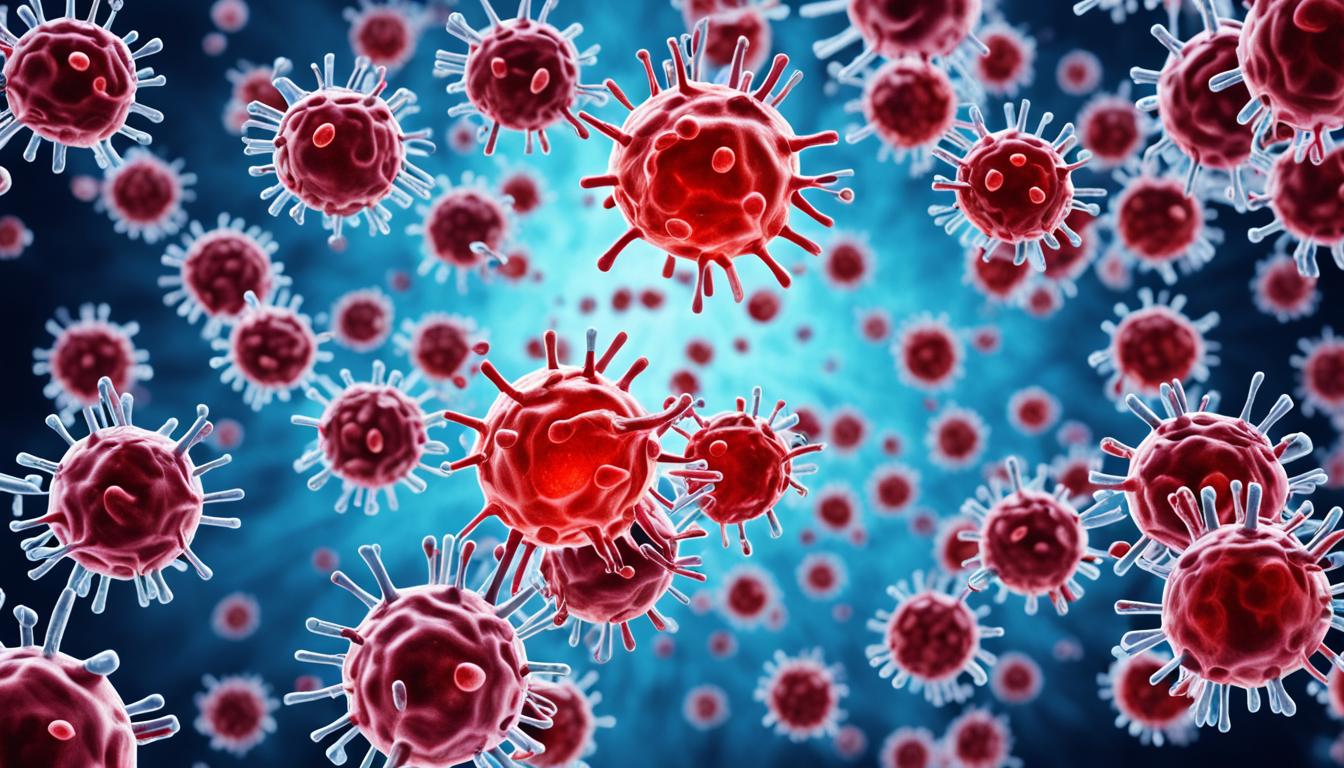Parvovirus B19 is a virus that exclusively impacts humans. It leads to illnesses like fifth disease and more. It spreads through respiratory droplets and blood, so preventing spread is vital. If a pregnant woman catches this virus, it can pass to her baby.
Children, mainly those in school, are often infected. Symptoms include a ‘slapped cheek’, rash, and joint pain. Those with weak immune systems can face serious issues from the virus.
To diagnose this virus, doctors use blood tests and DNA tests to find the virus. Currently, doctors manage symptoms. But there’s hope in stem cell therapy as a future treatment.
Key Takeaways:
- Parvovirus B19 is a human-specific virus that causes various diseases.
- Transmission occurs through respiratory secretions and blood products.
- Children, especially school-aged children, are more susceptible to parvovirus infection.
- Common symptoms include headache, fever, “slapped cheek” appearance, rash, and arthritis.
- Diagnosis is achieved through serum antibody testing and PCR testing.
- Treatment is usually symptomatic, with intravenous immunoglobulins used in severe cases.
- Stem cell therapy is being investigated as a potential treatment option.
Etiology and Epidemiology of Parvovirus Infection
Parvovirus B19 is a tiny virus with one layer around it. It has a simple DNA and causes diseases in people. This virus doesn’t pass between humans and animals. The main way it spreads is through the air and blood.
This virus is a big worry around the world, especially for kids in school. Kids usually catch it more than adults do. But, adults over 20 and those above 70 can get it too. The virus spreads more in late winter and early summer.
Occasionally, many people get the virus in a small area. This happens every few years. Health officials must be ready to control these small outbreaks.
Epidemiological Data of Parvovirus B19 Infection by Age Group
| Age Group | Prevalence |
|---|---|
| Children (School-aged) | High |
| Adults (>20 years) | Variable, but higher rates |
| Elderly (70 years and older) | Variable, but higher rates |
Learning about the virus helps us stop it from spreading. With good hygiene and safe blood, we can reduce its spread. It’s important to have plans in place to protect people from this virus.
Diagnosis and Treatment of Parvovirus Infection
Doctors diagnose parvovirus by testing the blood for IgM antibodies. This shows a recent infection. They can also use PCR testing to find the virus in serum or tissue samples. These tests are key to check for parvovirus and plan the right treatment.
Treating parvovirus is mainly about handling the symptoms. Many kids with fifth disease, for example, don’t need special care. But if they develop arthritis, using NSAIDs can help ease the pain. For serious cases like aplastic crisis, red blood cell transfusions might be needed to aid recovery.
Pregnant women with parvovirus must be monitored closely. In severe cases, the unborn baby might need fetal blood transfusions. Sometimes, intravenous immunoglobulins are used to boost immunity and reduce damage from the virus.
There’s ongoing research around stem cell therapy for fighting parvovirus. This exciting option looks to use the body’s stem cells to combat the infection. However, more research and trials are necessary to understand how effective and safe it is for treating parvovirus.
FAQ
Q: What is parvovirus infection?
A: Parvovirus infection is a viral illness caused by Parvovirus B19, and humans are the only hosts. It may lead to illnesses like fifth disease or others including aplastic crisis and hydrops fetalis.
Q: How is parvovirus infection transmitted?
A: This illness spreads through the air and by infected blood. It moves from person to person when they are close or through medical procedures like blood transfusions.
Q: Who is most at risk for parvovirus infection?
A: Children, especially those at school, are at higher risk. Yet, adults over 20 and seniors over 70 are also more likely to have it.
Q: What are the symptoms of parvovirus infection?
A: Symptoms include a rash, fever, and muscle aches. People might also get a red cheek look or swollen joints. Symptoms can be mild or severe.
Q: How is parvovirus infection diagnosed?
A: Doctors use blood tests to look for certain antibodies to diagnose it. They might also directly test for the virus in your blood or other tissue.
Q: What is the treatment for parvovirus infection?
A: Most people do not need specific treatment. Arthritis might be helped with NSAIDs. Those with severe blood symptoms could be helped by blood transfusions or immunoglobulins.
Q: Can parvovirus infection be prevented?
A: Unfortunately, there is no vaccine yet. However, washing hands well and avoiding sick people are good ways to lower your risk. Pregnant women especially should be careful.
Q: Can animals transmit parvovirus infection to humans?
A: No, humans cannot get parvovirus B19 from animals. It only spreads from person to person.
Note: The information shared is for learning purposes and not medical advice. Always see a healthcare provider for proper care against parvovirus.

